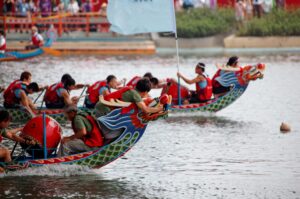By Ajuonuma Ifechukwu Victory and Amadi Somtochukwu Favour
Every country or region has peculiar traditions and cultures that are held in high esteem and revered for generations. The Eyo festival in Yorubaland , the New Yam festival in Igbo land, the Durbar festival among the Hausas and even the Ekpe festival in Akwa Ibom state are popular Nigerian festivals. These festivals are rooted in culture, beliefs and age long values that are dear to the people. Other countries and even continents have peculiar festivals rooted in tradition and the Dragon Boat festival among the Chinese is one of them.
The Dragon Boat Festival, also known as Duanwu Festival, is a vibrant and deeply symbolic celebration that blends history, tradition, and communal spirit. Observed on the fifth day of the fifth lunar month, this festival is marked by a variety of customs, each carrying profound cultural significance. From thrilling dragon boat races to the preparation of traditional delicacies, every aspect of the festival tells a story rooted in Chinese heritage.
One of the most iconic and exhilarating aspects of the Dragon Boat Festival is dragon boat racing. These races feature long, ornately decorated boats carved in the shape of dragons, manned by teams of paddlers who row in perfect synchrony to the beat of a rhythmic drum. The event is not just a test of physical endurance and teamwork but also a spectacular display of cultural heritage. Historically, dragon boat racing originated as a ritualistic attempt to recover the body of the beloved poet and statesman Qu Yuan, who, in an act of despair over his country’s decline, drowned himself in the Miluo River. Today, these races serve as a powerful symbol of perseverance, unity, and collective strength, drawing participants and spectators from all over the world.

Dragon boat racing. ( Photo credit: Asiascot.com)
No Dragon Boat Festival celebration is complete without zongzi, a traditional delicacy that holds deep historical meaning. These pyramid-shaped glutinous rice dumplings, wrapped in bamboo leaves, are filled with a variety of ingredients such as red bean paste, dates, or marinated meat, with variations depending on the region. This custom traces back to the ancient practice of throwing rice into the river to feed the fish, ensuring that Qu Yuan’s body remained undisturbed. Today, the preparation and sharing of zongzi is a cherished ritual, bringing families together in a spirit of warmth and remembrance.
In addition to dragon boat races and zongzi, the Dragon Boat Festival is rich with customs meant to protect against misfortune and promote well-being. One of them is hanging calamus and moxa on the doorways. Families adorn their doorways with calamus (a medicinal plant) and moxa (dried mugwort) to ward off evil spirits and diseases. These plants are believed to possess purifying and protective properties.
Also, it is a thing for children to wear colorful and fragrant embroidered sachets filled with aromatic herbs. These beautifully crafted pouches are thought to bring good luck and repel negative energies.
In some regions, it is customary to drink realgar wine, a traditional Chinese liquor infused with realgar (an arsenic sulfide mineral). Though its medicinal use has declined over time, it was historically believed to protect against illnesses and ward off evil spirit. Each of these customs contributes to the festive atmosphere and reflects the ancient Chinese beliefs in health, protection, and spiritual harmony.
The Dragon Boat Festival is not just a day of celebration; it is an embodiment of cultural pride and social cohesion. It serves as a time for people to reconnect with their heritage, reinforce familial bonds, and foster a sense of unity within their communities. The festival’s customs symbolize themes of loyalty, sacrifice, and resilience—values deeply rooted in Chinese history and tradition.
The festival brings together families, friends, and neighbors in shared activities. Whether paddling in unison during a race or preparing zongzi with loved ones, these traditions reinforce the importance of collective effort and togetherness. These customs also remind the people of their symbolic meanings that have been upheld over the ages.
Dragon boat races represent the human struggle against adversity, echoing the ancient efforts to honor Qu Yuan. Eating zongzi serves as a tribute to his spirit, reinforcing themes of loyalty and remembrance. The use of protective herbs and rituals highlights the enduring belief in safeguarding well-being.
This festival has also inculcated it’s values into the younger generation by ensuring that schools and cultural institutions frequently host workshops and storytelling sessions about the origins and customs of the festival. These initiatives help younger generations understand their cultural roots and appreciate the historical narratives that shaped their traditions.
While the Dragon Boat Festival is deeply ingrained in Chinese culture, its influence has extended far beyond China’s borders. Today, international dragon boat races are held in numerous countries, promoting cultural exchange and fostering connections between people of diverse backgrounds. The festival has become a global celebration of teamwork, resilience, and cultural appreciation, demonstrating how traditions can transcend geographic boundaries and bring people together.
At its heart, the Dragon Boat Festival is more than just a commemoration of a historical figure—it is a living tradition that continues to inspire and unite people. It represents a profound respect for cultural heritage, a commitment to community spirit, and the enduring values of perseverance and solidarity. Whether celebrated in bustling cities or tranquil riverside villages, the festival remains a cherished occasion that bridges the past with the present, ensuring that its legacy continues to thrive for generations to come.
